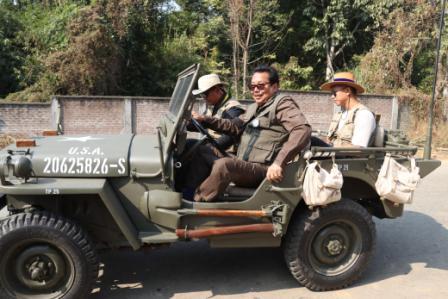-
 Arunachal tableau on R-Day spotlights state’s emergence as Adventure Capital…
Arunachal tableau on R-Day spotlights state’s emergence as Adventure Capital…
-
Etalin marks National Voters’ Day, encourages youth participation in democracy
-
Sona reviews PMGSY, VVP projects in Itanagar Circle
-
Lok Bhavan celebrates UP Diwas
-
 KGBV student leads WPS Pasighat on National Girl Child Day
KGBV student leads WPS Pasighat on National Girl Child Day
-
Meritorious students felicitated on National Girl Child Day
-
Awareness on POCSO held as part of National Girl Child…
-
Anini certifies 79 Nature Guides on National Tourism Day
-
 Startup success stories reflect potential of state’s youth: CM
Startup success stories reflect potential of state’s youth: CM
-
 Mein participates in vintage Willys Jeep Rally, inaugurates World War…
Mein participates in vintage Willys Jeep Rally, inaugurates World War…
The epithet of ‘Killing Fields’ has long been associated with West Asia and the liquidation of General Qassem Soleimani, the head of Iran’s Quds Force and practically the de facto viceroy not only of Iran, but also of the present Iraq and Syria on Friday by the United States is perhaps a revisit to this truth. It has sent shivers all across the world and since Iran has announced that a ‘severe revenge’ will be awaiting US, tensions have automatically reached to very high levels with fear that another massive military confrontation like that of the 90s Gulf War might well be a possibility. India had never been a party to the protracted Arab-America or Arab-Israel conflict, but still, deep concerns have surfaced, with disquiet hovering around issues relating to the possible impacts over Indian economy. Reading the Indian reactions as of now, it is clear that jitters have already started and fear is particularly regarding the strong possibility of international oil prices touching new highs. In that case, the current struggle for revival of the nation’s economy will become a more difficult task as oil prices have a direct bearing on almost all vital fronts of economy touching the common man. How this unforeseen challenge is going to be handled is a big question. But it will surely engage the national think tank for quite a while.
There are obvious reasons why troubled times are expected to arrive sooner or later. Indian economy is stuttering at the moment with GDP growth falling beyond expectations along with forecast that there are little chances of any immediate improvement. Along with this, there is a growing uneasiness when it comes to fiscal deficit and an already high unemployment rate which had touched almost all sectors. At this precarious juncture, the Soleimani extermination fallout has come as an external shock which will be rather difficult for the economy to absorb. International oil prices have already jumped by $3 a barrel and if the trend continues, India will not be immune to the ripples and this will mean more inflationary pressure where direct and immediate repercussions will be felt by none other than the common man. Adding to this, there are also apprehensions regarding the negative impact on India’s trade prospects with West Asia which now stands at $ 78 billion and the solid $40 billion remittances which annually flow from the sizeable Indian diaspora working in the Gulf.
A multiple set of challenges have visited the country’s economy as ‘unexpected guests’ at a time when it’s suffering from a loss of stamina. The next few weeks will hence be crucial when the singular task will be to shield the economy to the maximum from these overseas aftershocks.

Kenter Joya Riba
(Managing Editor)She is a graduate in Science with post graduation in Sociology from University of Pune. She has been in the media industry for nearly a decade. Before turning to print business, she has been associated with radio and television.
Email: kenterjoyaz@easternsentinel.in / editoreasternsentinel@gmail.com
Phone: 0360-2212313

